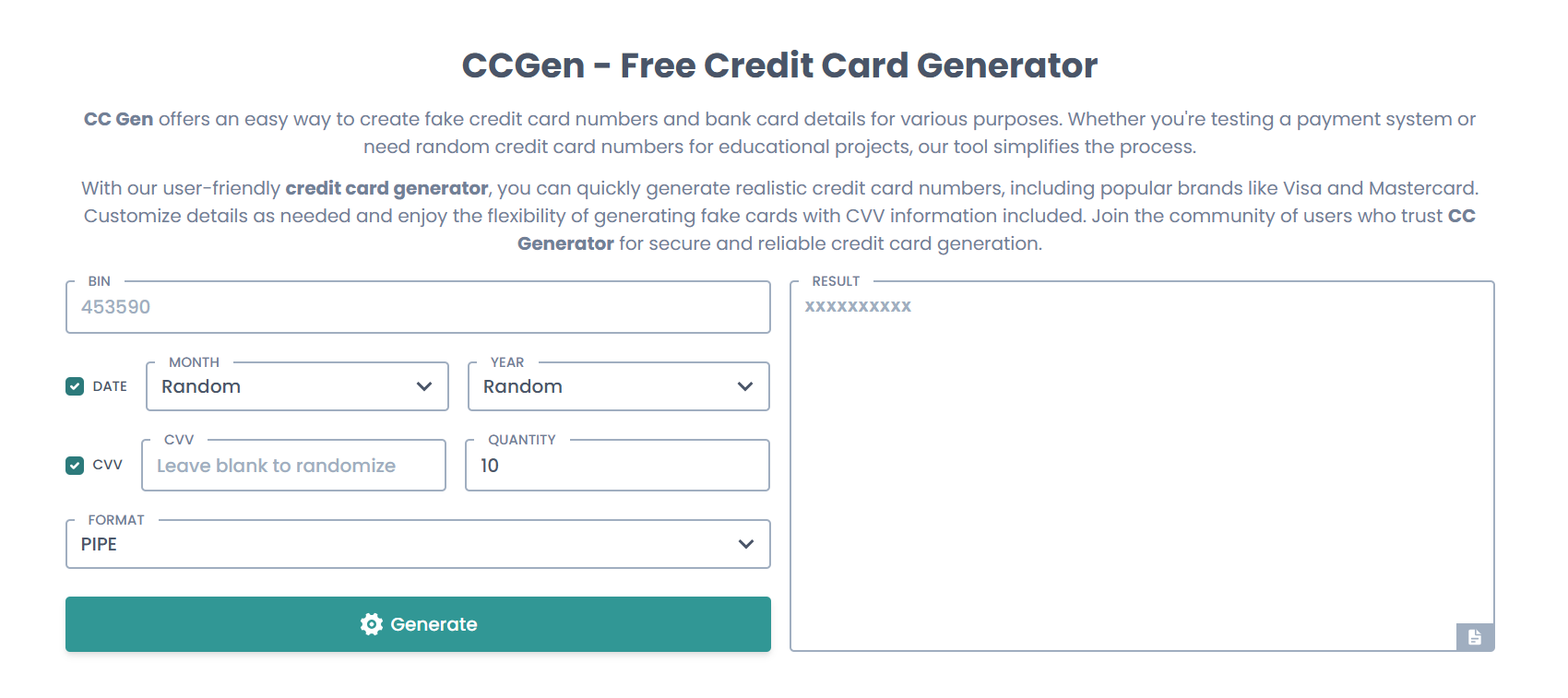Testing payment systems requires versatile tools that can generate different types of credit card numbers. CCGen is a free online tool designed to produce fake credit card numbers for testing and educational purposes. Many users wonder if CCGen supports multiple credit card types beyond the common brands.
CCGen focuses on generating realistic and valid fake credit card numbers, primarily for Visa and Mastercard. This ensures compatibility with most testing environments while maintaining accuracy. The question remains whether CCGen’s scope extends to other card brands or types.
Supported Credit Card Types in CCGen
Visa Card Generation
Visa is the most widely recognized credit card brand globally. CCGen generates fake Visa card numbers starting with the digit “4” and adhering to Visa’s length requirements of 13 to 16 digits. These generated numbers pass the Luhn algorithm validation for authenticity. This makes CCGen reliable for Visa card testing. Visa cards remain a primary focus.
Mastercard Number Generation
Mastercard uses specific prefixes ranging from “51” to “55” and “2221” to “2720.” CCGen creates fake Mastercard numbers conforming to these prefixes and the 16-digit length standard. Like Visa, these numbers pass Luhn validation to ensure structural accuracy. Mastercard generation complements Visa support well. Both brands cover major testing needs.
Absence of Other Card Brands
Currently, CCGen does not generate numbers for other major brands like American Express, Discover, or Diners Club. These cards have unique number formats and prefixes requiring specialized algorithms. CCGen’s limited scope means users needing those brands must seek other tools. Expanding supported types may happen in future updates.
CCGen Focuses on Visa and Mastercard
Market Dominance of Visa and Mastercard
Visa and Mastercard together represent the vast majority of global credit card transactions. Supporting these two brands covers most developer and tester requirements for payment simulations. CCGen targets this broad user base effectively. Focusing on dominant brands optimizes tool usability. It ensures relevance for most testing scenarios.
Complexity of Supporting Other Brands
Each card brand has unique formats, prefix rules, and validation nuances. Adding support for cards like American Express requires significant development effort. CCGen’s current scope allows it to maintain high accuracy and reliability without overextending. Specialization enhances quality. Broader support may reduce precision.
Streamlined Development and Maintenance
By concentrating on Visa and Mastercard, CCGen simplifies its codebase and update process. This focus allows quick adaptation to evolving industry standards for these brands. It helps maintain tool stability and user trust. Streamlining development benefits performance and user experience. Expansion can come with careful planning.
Potential for Future Expansion
User Demand for Additional Card Types
As more developers seek diverse test data, demand for other card types increases. CCGen’s team may consider adding support for American Express, Discover, and others based on user feedback. This would enhance the tool’s versatility. Community input influences rthe oadmap. Expansion plans remain under evaluation.
Challenges in Implementing New Card Algorithms
Supporting additional card brands involves integrating new prefix ranges, length constraints, and validation checks. It requires rigorous testing to ensure generated numbers are accurate and useful. Complexity must be balanced against benefits. Quality assurance is paramount. This influences development timelines.
Importance of Maintaining Accuracy
Adding new card types must not compromise the accuracy of existing Visa and Mastercard generation. CCGen prioritizes reliable output over quantity. Ensuring valid Luhn checksums and format adherence remains critical. Maintaining trust is key. Expansion must be carefully managed.
Supplement CCGen’s Capabilities
Using Multiple Tools for Diverse Needs
Developers needing test numbers for unsupported brands can combine CCGen with other credit card generators that specialize in those types. This multi-tool approach covers broader testing requirements. It allows flexibility while leveraging CCGen’s strengths. Strategic use maximizes testing coverage.
Manual Validation and Custom Generation
Advanced users can manually modify CCGen numbers or use scripts to generate additional card types based on known formats. However, this requires expertise to maintain accuracy. Careful validation is essential to avoid errors. This approach suits experienced testers. It extends testing possibilities.
Community Resources and APIs
Some third-party APIs and open-source projects offer multi-brand fake card generation. Integrating such resources alongside CCGen can enhance test data diversity. Combining tools balances ease of use with comprehensive coverage. Community tools can fill gaps. Integration enhances functionality.
Conclusion
CCGen currently supports generating fake credit card numbers only for Visa and Mastercard, two of the most widely used card brands. This focus ensures high accuracy, structural validity, and reliability for most testing scenarios. While it does not support other card types like American Express or Discover yet, there is potential for future expansion based on user demand. Users requiring multiple card types can supplement CCGen with additional tools or custom solutions to meet their testing needs effectively.







